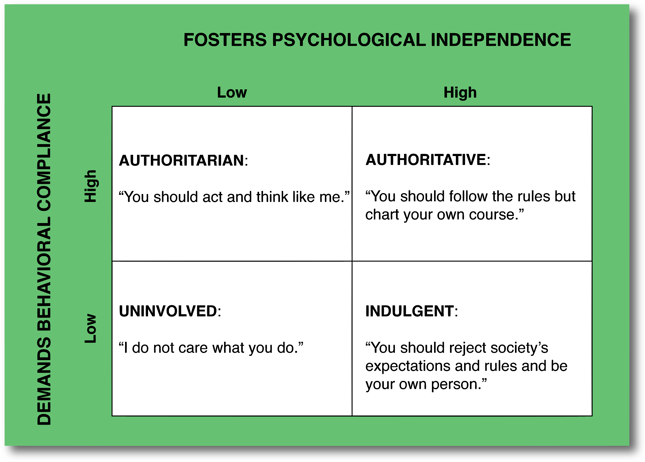As the father of two teenage girls, any article about parenting tends to catch my attention. I found an article Parenting Style and Its Correlates by Nancy Darling particularly interesting both as a parent and as an administrator for a community corrections facility. While there is not much new information in this article about which parenting style typically results in well-adjusted children, it is a great summary. What was new for me in reading this article is the parallel that I see in working with offenders.
A Couple Key Definitions
Parenting: It is assumed that the primary role of all parents is to influence, teach, and control their children. A parenting style is the overall pattern of the extent and focus of control.
Psychological control: "You should adapt my values, goals, and judgments."
Behavioral control: "You are expected to play by the rules of this family."
Parental responsiveness refers to "the extent to which parents intentionally foster individuality, self-regulation, and self-assertion by being attuned, supportive, and acquiescent to children's special needs and demands."[i] I refer to this characteristic in the table below as “fosters psychological independence.”
Parental demandingness refers to "the claims parents make on children to become integrated into the family whole, by their maturity demands, supervision, disciplinary efforts and willingness to confront the child who disobeys."[ii] I refer to this characteristic in the table below as “demands behavioral compliance.”
Can you start to see the parallel between parenting and our work in supervising offenders?

Summary of the Four Quadrants
Authoritarian parenting style typically embodies high psychological control and high behavioral control. Behaviors that violate the norms or boundaries of the family are confronted quickly and met with appropriate consequences. There is the expectation that the rules of the family be followed without question, and the child is generally expected to accept the values and goals of the parents without question. There is little tolerance for expression of independence or individual choice. In summary, the authoritarian parent's (often unconscious) goal is to produce a child that plays by the rules and thinks like the parent."
Authoritative parenting style is often referred to as "firm but fair." Like authoritarian parenting, it expects behavioral compliance with basic family rules and expectations (high behavioral control). However, unlike authoritarian parenting style, independence, individual choice, and collaborative discussions are encouraged (low psychological control). In summary, the authoritative parent's (usually intentional) goal is to produce a child that plays by the rules and develops a sense of separate identity and independence of thoughts and goals."
Indulgent parents "are more responsive than they are demanding.” They are nontraditional and lenient, do not require mature behavior, allow considerable self-regulation, and avoid confrontation."[iii] In short, indulgent parents are low on control and high on individual choice. This concept is portrayed in Hollywood as the “hippy” child of the 60s parent who believes that their fight against society’s rules and expectations resulted in an unconventional lifestyle with abundant internal joy. They want the same for their children.
Uninvolved parents are low in both responsiveness and demandingness. In extreme cases, this parenting style results in neglect, but is often simply the result of their own sense of being overwhelmed with life’s expectations. This is usually portrayed as drug involved parents or wealthy parents with high power careers that consume the majority of their time and energy.
My Community Corrections Takeaway
People need rules and expectations in order to develop a social self that considers their impact on others AND they need the freedom of choice to develop a personal self that pursues their own values and goals.
To me, the authoritative style describes a good supervising agent or case manager as much as it does a parent. While there are obvious differences, appreciating the importance of psychological independence while maintaining behavioral accountability appears to be our primary job.
Let’s just say that my two teenage girls do not lack in psychological independence. They think I am the dumbest person on the planet! I am told this is a phase. Hope springs eternal.
[i] (Baumrind, 1991, p. 62)
[ii] (Baumrind, 1991, pp. 61- 62)
[iii] (Baumrind, 1991, p. 62)


